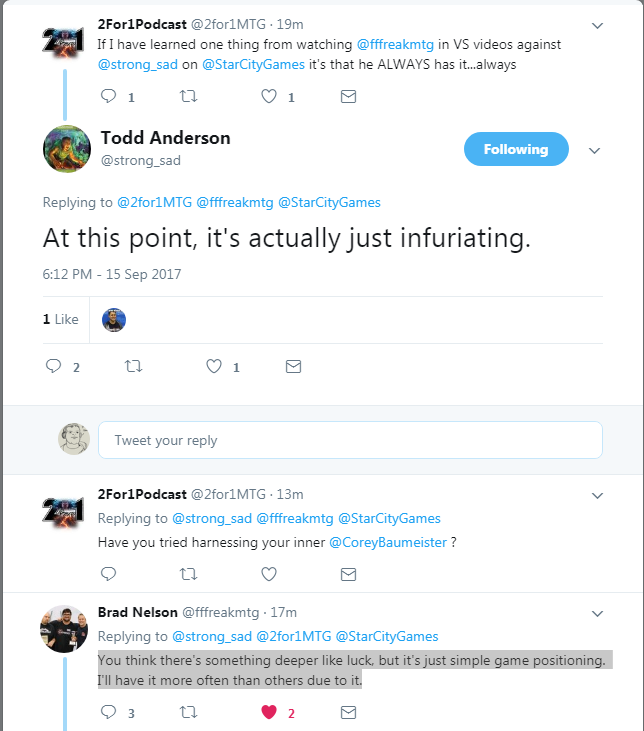Two Birds One Stone

Getting better at Magic means always asking questions. More than just what the correct lines are, we need to know what makes them the correct lines. Likewise we need to know not just what mistakes we made but what led to those mistakes. So, when I hit a wall and can’t find the answers to my questions it’s frustrating, it feels like not answering those questions is inhibiting my development as a player. A few weeks ago, I had two conundrums that were answered by just one little tweet. Well, answers sometimes do come from unlikely places. Before I show you guys the tweet let’s go over the two questions I had.
Recently, one of my favorite players and writers, PV, wrote an article that blew many players minds. Not only in Magic, the article also struck a chord with many Hearthstone players. The article I’m talking about is his piece on the sunken cost fallacy which you can find here https://www.channelfireball.com/articles/its-better-to-make-one-mistake-everyone-sees-than-two-only-you-know-about/. It’s very well written and for anyone who doesn’t know what the sunken cost fallacy is I highly recommend you read it. The problem I personally had with this piece is that I knew about everything he mentions already. While others were leveling up their skill set, I stayed the same and I find this happens to me more the longer I’ve been playing Magic. I don’t want to come across arrogant, I’m certainly not saying I know everything there is to know about Magic theory, but after playing for a long time you start to see repeats in old conversations. For example, I remember LSV talking about the sunken cost fallacy before. So my first conundrum was this: Why, if I know a lot of these gaming/Magic theories, do I still play so poorly at times? I didn’t know, and this is the source of much of my life’s frustration, somehow I have a lot of knowledge and I’m not always converting it into wins.
My second puzzle came from a conversation I had with some of the other team Troll Trader guys. We talked about variance in Magic and the difference between the top guys and the mid-level grinders. I was making a point about how even though PV is one of the best players in the world, he is a tad fortunate. While he has so many top 8s he doesn’t have many top 16s, meaning his conversion rates are insane and there is always a touch of luck with that kind of conversion. Many times he could have got mana screwed or flooded and fallen short but didn’t. This conversation turned into what was the difference between us and the top end players. Some of the other members thought it could just be a little bit of variance, that one of us could make a few deep runs and be on that highest level. I disagreed, I think there is still a decent margin there, yes sometimes they can be on the right side of variance but there is a reason they are closing their opportunities and we don’t always. I couldn’t really explain it better than that though. The guys had a lot of valid points but I couldn’t really put my finger on why I thought that margin was still there. The answer to both these questions came from Brad Nelson when he was ribbing Todd Anderson a little on Twitter.

Now anyone who’s ever watched the Vs Video series knows Todd and Brad have a friendly rivalry and will sometimes try and rile each other up a little on Twitter. There is a little bit of that here but at the same time Brad makes one of the better points I’ve seen a Magic player make for a long time. Brad doesn’t get lucky all the time, it seems like that to others but he uses what he calls game positioning. This means that he is trying to think turns ahead, he’s maximizing his outs and mapping the use of his resources far ahead of the majority of players. He is positioning himself to have the most chances at winning any given game. So when he hits his out it might seem like he’s fallen on the right side of variance but in reality he’s been giving himself the most outs possible for turns in a row. Most of us plan a turn or two ahead but Brad is constantly managing his resources and knows what he wants the game to look like 4-5 turns ahead of time. How does this answer my questions? Well this lets me articulate my point to the Troll Trader team much better. High end players may look like they get luckier than the average grinder but they are just trying to minimize these variances with their game management. To break it down, they are giving themselves less chances to get unlucky and more chances to get lucky. Now my other question is answered by asking how does Brad do this? How does he position himself so well in games? An easy answer to that is he’s always fully engaged in the game. Brad is always thinking of the best uses of his resources and of how to work towards his overall plan. That’s where I think I’m failing some of the time. I don’t always stay engaged in games, I tend to auto pilot. I play so often that it’s hard to stay engaged in every game, I think this is a poor habit that I’m picking up from playing so much Magic Online. If I’m not even engaging in these games how am I supposed to be applying the knowledge I’ve learned over the years?
So what is the takeaway from all this? I think that players, including myself, use variance as a crutch too often. When they see a better player doing well they think that they are just a good run away from that level but it’s not always true. If your mindset is like this you are prohibiting yourself from improving and really searching for what can make you better. Also, an easy lesson is that auto piloting is terrible to do in Magic, however it is definitely something we are all guilty of. When we are far ahead we should be keeping our foot on the throttle and when we are behind we should be looking for those tiny percentages to pick up wins. I know this is something that will take me a long time to improve on, but it is certainly very satisfying to get answers to some of the tougher questions.





